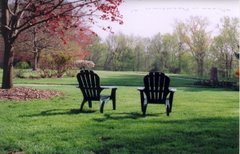
On Retreat with Thich Nhat Hanh
I recently attended a six-day retreat led by the Buddhist monk Thich Nhat Hanh. The sessions, which drew 800 people, were held at Stonehill, a Catholic college near Boston. It was my ninth retreat with Nhat Hanh, and each one has been a profound and memorable experience. The Stonehill retreat included talks by Nhat Hanh, small group discussions, meditation and vegan meals eaten in silence.
On the final day, I took part in an early morning ceremony in which I pledged to honor the Five Mindfulness Trainings, which are similar to the Ten Commandments. The five trainings ask us to refrain from killing, stealing, sexual misconduct, lying, and ingesting drugs or alcohol.
The most controversial prohibition turns out to be the one involving alcohol. People on retreat often ask why they should give up alcohol. Two primary reasons are cited. First, liquor clouds the mind and takes us away from the present moment. A central tenant of Buddhism involves the importance of being fully awake and present in each moment of our lives. The second reason involves recognition of the suffering caused by alcohol abuse, a serious addiction that destroys lives and rips apart families.
By not drinking alcohol we say, in effect, that we understand the devastation caused by drinking, and we desire to support those in recovery by not drinking. I was drawn to the Five Mindfulness Trainings, in part, because of their recognition of the damage caused by alcohol. I’m disappointed that the Catholic Church has not always shown a similar awareness about alcohol abuse.
It might surprise some to learn that many Catholics aspire to live by Buddhist principles. It helps to think of Buddhism as a way of life, rather than a religion. The Buddha, who lived 2,500 years ago, discovered principles that can lead to a happier life, with less suffering. Buddhists do not seek converts. Thich Nhat Hanh urges Christians to draw on the spiritual wisdom of their own religion, rather than think about conversion.
Buddhism can deepen one’s spiritual practice, but it never claims to be the sole path to truth and wisdom. Two of Nhat Hanh’s books, Living Buddha, Living Christ and Going Home: Jesus and Buddha as Brothers, focus on the common teachings in the two faiths. Among the Buddhist principles that speak to me are these:
1.Impermanence. Buddhists point to aging, illness and death. Nothing lasts. We all return to dust. Recognition of impermanence helps us to live more joyfully in each moment.
2.Non-attachment. If everything fades, we soon realize how much pain we cause ourselves by clinging to material things, jobs, routines and relationships. We can enjoy everything in the present moment without clinging or attachment.
3.Compassion. This, of course, is no different from what Jesus taught. Buddhists talk about inter-being, the idea that we are all one, in which case war and violence make no sense. Buddhists seek to develop a finely tuned compassion for their own suffering, as well as the suffering of people around the world.
4.Forgiveness. Again, this is what Jesus taught, but it seems to be a difficult concept for many believers. Some people say they can forgive the little slights and hurts, but then draw a line beyond which they cannot forgive. One misconception is that forgiveness excuses harmful acts or crimes, but this is not true because forgiveness is about the person, not the crime. After a horrible crime, forgiveness means we let go of hatred, violence, revenge and anger directed at the perpetrator, who is still loved by God. We do not forgive the crime. That distinction is important.
5.Meditation. Buddhists stress the importance of regular meditation. During meditation, we come home to the present moment. Each time our mind wanders off, we bring it back to this moment. Meditation calms the mind, reduces stress and helps us to live joyfully in each moment. Of course, meditation is not unique to Buddhism. The Catholic priest Thomas Keating has promoted Centering Prayer, a form of meditation similar to Buddhist practice.
Thich Nhat Hanh left his native Vietnam during the Vietnam War. He now lives in France with his fellow monks and nuns at a monastic community called Plum Village, and he has opened monasteries in New York and California. He visits the United States to give retreats every other year.
Ten years ago several of us from the Hartford area attended a retreat with Nhat Hanh in New York, and afterward decided to start a meditation group, which we named the Greater Hartford Sangha. We meet for meditation and sharing in West Hartford every other Tuesday evening at 7:30.
Bill Williams
Bill Williams of St. Helena’s parish in West Hartford hosts the Greater Hartford Sangha. He can be reached at billwaw@comcast.net, or 860-561-3563.


